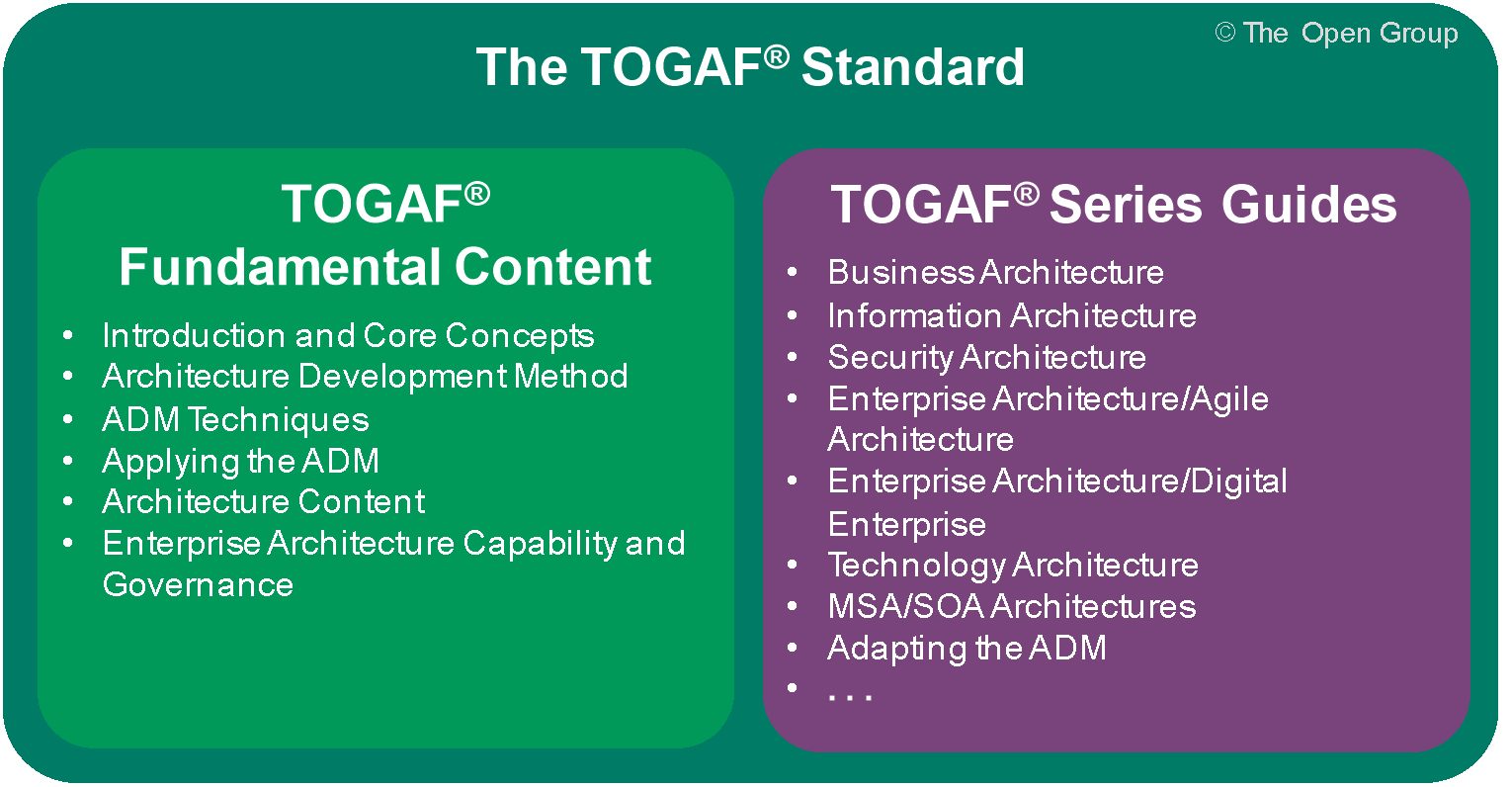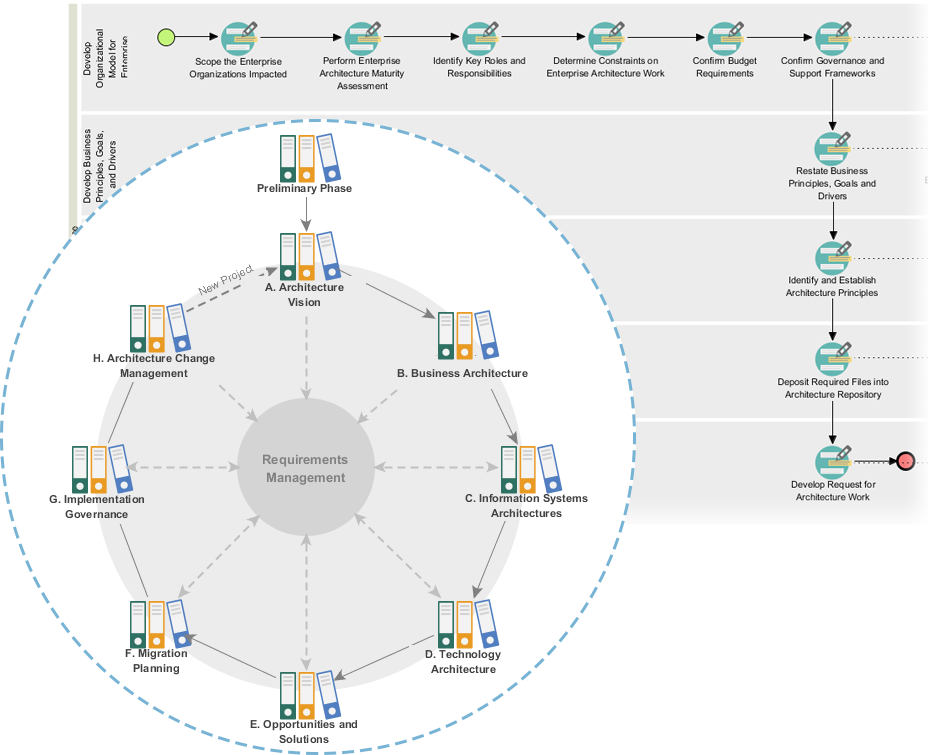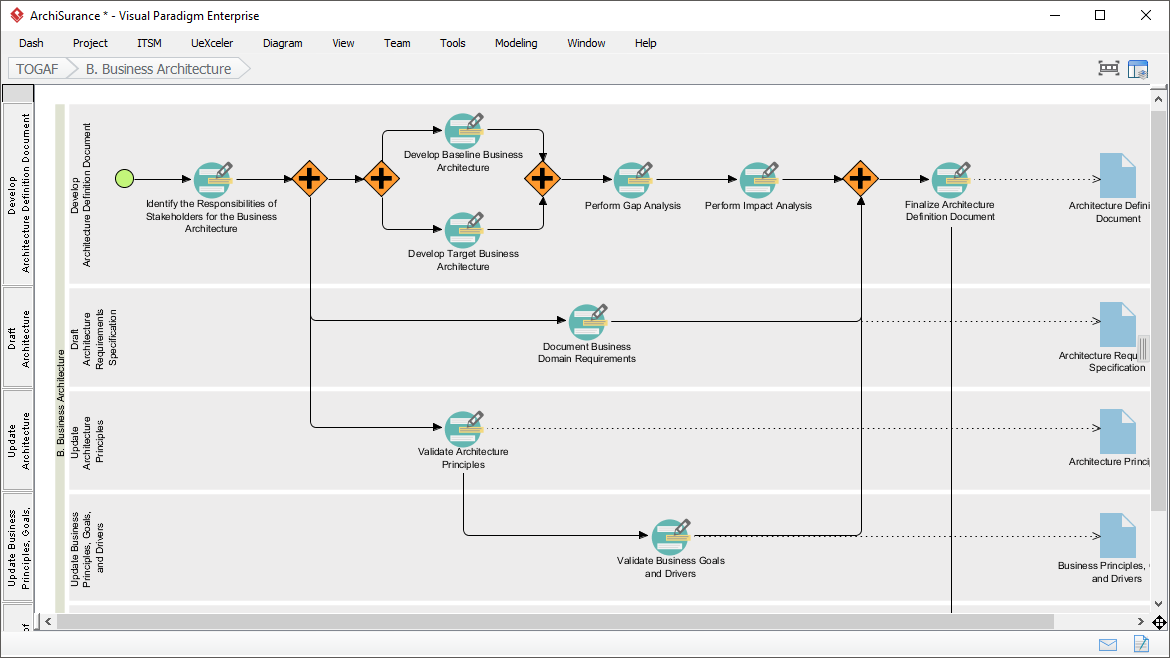TOGAF 10 Overview
TOGAF 10, the latest version of The Open Group Architecture Framework, represents a significant advancement in enterprise architecture (EA). It provides a structured method for designing, planning, implementing, and governing EA, ensuring that IT aligns with business objectives and strategic goals1.
Key Features and Improvements
- Expanded Guidance and How-To Material: TOGAF 10 offers greatly expanded guidance and how-to material, making it easier for organizations to operate efficiently and effectively. This includes detailed instructions and best practices for various use-cases, including agile enterprises and digital transformation2.
- Universal Concepts and Variable Configuration: The framework is designed to balance universal concepts with variable configuration, allowing customization based on specific enterprise requirements. This flexibility ensures that TOGAF 10 can be adapted to a wide range of industries and organizational structures2.
- Accessibility and Practitioner Support: TOGAF 10 is designed to be more accessible for practitioners, guiding users through enduring and universal concepts, proven best practices, and exploring new emerging ideas. It is not limited to specific industries and can be used by organizations of all sizes, including government departments, non-government organizations, and defense agencies2.
- Structured Method for Enterprise Architecture: TOGAF 10 provides a comprehensive approach to enterprise architecture, offering a structured method for designing, planning, implementing, and governing EA. This includes a well-structured study guide that breaks down the framework into manageable sections, allowing for systematic understanding of its concepts and principles1.
TOGAF 10 Study Guide
The TOGAF 10 Study Guide is essential for comprehending the basics of TOGAF 10. It serves as a resource that breaks down the framework into manageable sections, allowing for the systematic understanding of its concepts and principles. Mastering the TOGAF 10 Study Guide is crucial for aspiring enterprise architects, as it equips them with the skills and knowledge needed to excel in the field1.
TOGAF 10 Document Structure
The TOGAF 10 document structure is a comprehensive guide through the various parts of the TOGAF document, each offering unique insights and tools for architects and practitioners. From the foundational concepts in Part I to the intricate methodologies of the Architecture Development Method (ADM) in Part II, TOGAF unfolds as a comprehensive resource for anyone involved in enterprise architecture. The document structure ensures that the human element is aligned with the structural and methodological aspects of TOGAF, making it a valuable resource for navigating the complexities of enterprise architecture3.

TOGAF ADM Phases
The TOGAF Architecture Development Method (ADM) is a core component of TOGAF 10, providing a step-by-step approach to developing and implementing enterprise architecture. The ADM includes several phases, each with specific objectives, activities, inputs, steps, and outputs. For example, Phase E (Opportunities and Solutions) focuses on evaluating options, identifying strategic parameters, and formulating a comprehensive strategy for introducing the Target Architecture. This phase marks the transition from strategic planning to practical implementation, ensuring that architectural vision is translated into tangible action plans4.

TOGAF 10 Certification
The TOGAF 10 Combined Exam (OGEA-103) is a valuable certification for enterprise architects, offering a comprehensive understanding of the TOGAF framework. Preparing for the exam involves detailed videos on each phase of the ADM, interactive instructor-led case studies, and practice with real-world examples of enterprise architecture projects. The TOGAF documentation is comprehensive, covering all aspects of the framework and providing a standardized approach to ensure that IT aligns with business objectives and strategic goals5.
Visual Paradigm as the Best TOGAF Tool
Visual Paradigm is widely recognized as the ultimate TOGAF tool for executing the recommended steps of the TOGAF Architecture Development Method (ADM). It offers a range of features that make it an invaluable asset for enterprise architecture teams:

- Intuitive ADM Process Navigator: Visual Paradigm features an intuitive ADM process navigator that guides users through the entire TOGAF ADM, step by step. This tool acts like a tutor, providing instructions, tips, samples, and case studies to help users understand and execute TOGAF activities effectively7.
- Customizable Architecture Repository: The tool allows users to configure the standard TOGAF architecture repository structure or any other kind of file taxonomy. This customization ensures that files can be intuitively placed and organized according to the specific needs of the organization8.
- Deliverable Composer: Visual Paradigm enables users to produce TOGAF deliverables with ease. By following on-screen instructions, filling in forms, and drawing ArchiMate diagrams, users can generate the necessary deliverables for each phase of the ADM9.
- Visualization and Analysis: Visual Paradigm helps unleash the power of enterprise architecture by providing tools to visualize, analyze, and identify areas for efficiency gains within the organization. This visual approach enhances the understanding and implementation of enterprise architecture concepts10.
- Comprehensive Tutorials and Guides: The platform offers comprehensive tutorials and guides that cover core TOGAF and ArchiMate concepts. These resources ensure that users have a solid foundation in enterprise architecture and can effectively apply the TOGAF framework11.
In conclusion, Visual Paradigm is the best tool for EA teams working with TOGAF 10. Its intuitive navigation, customizable features, and comprehensive support make it an essential tool for successfully implementing the TOGAF framework.
Reference List
- Comprehensive Guide to TOGAF Standard, 10th Edition – Visual Paradigm TOGAF.
- A Comprehensive Guide for TOGAF ADM Phase E: Opportunities and Solutions (Part 6) – Visual Paradigm TOGAF.
- TOGAF ADM Software: Act and Generate ADM Deliverables.
- TOGAF® Standard, 10th Edition Downloads | www.opengroup.org.
- What is TOGAF?.
- The Best TOGAF Software.
- Best TOGAF Software with ArchiMate Tools.
- Mastering Enterprise Architecture with Visual Paradigm’s TOGAF Tool – ArchiMetric.
- TOGAF ADM Tools: Visual Learning and Deliverable Development.
- TOGAF ADM Process Navigator: Streamlined Architecture.
- Chapter 31. TOGAF ADM Guide-Through – Visual Paradigm Community Circle.
- TOGAF ADM Phase A | PDF | Enterprise Architecture | Profit (Economics).
- Working with TOGAF ADM Guide-through – Visual Paradigm Community Circle.
- TOGAF® Tool for Enterprise Architecture – ArchiMetric.